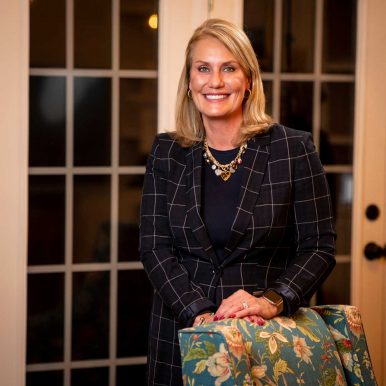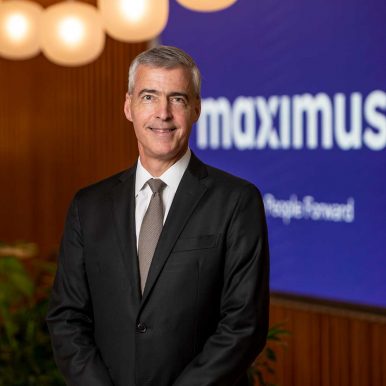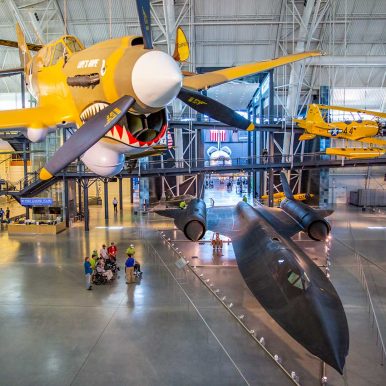‘Inferiority complex’ no more
Fairfax County becomes major tech hub
Sydney Lake //December 29, 2022//
‘Inferiority complex’ no more
Fairfax County becomes major tech hub
Sydney Lake //December 29, 2022//
As recently as 30 years ago, few people would have imagined that Fairfax County would grow to contain one of the most robust technology ecosystems in the nation, with thousands of tech-fueled firms, fed with workers trained by some of the state’s top universities.
Bruce Caswell, president and CEO of McLean-based federal tech contractor Maximus Inc., has been in Fairfax County for the past three decades. But he recalls a time when Fairfax — now home to 8,700 technology firms — didn’t compare to other tech epicenters in the U.S.
“There was a period where we had a bit of an inferiority complex because we would look at other regions like Silicon Valley or even the Route 128 corridor in Massachusetts and be envious of the way that they were building their technology ecosystems,” he says. “But I think we’re well past that at this point. If anything, we’re poised to become, if not the leading, already one of the very leading technology ecosystems in the country.”
How did Fairfax get there? Jennifer Taylor, president and CEO of the Northern Virginia Technology Council, says there’s been three major waves of tech innovation in the region since the 1990s: the emergence of the internet, the late 1990s dot-com bubble and the explosive regional growth of government contracting during the 2000s.
“Because Virginia is very business-friendly and because the federal government is the largest purchaser of tech products and services, it’s attracting the key pieces of the tech ecosystem,” she says. “Over 30 years, the area has just really flourished. All you have to do is take a look at the skyline and our infrastructure to see the growth.”
While government contracting has been a boon for the region, Fairfax County has also grown to attract commercial technology companies, Taylor adds. In the county alone, there are 44,000 open jobs, about 30% of which are in the tech industry, according to the Fairfax County Economic Development Authority (FCEDA).

Competing with other tech hubs
Silicon Valley has long been synonymous with tech startups. Currently, there are about 8,000 startup tech firms in the San Francisco Bay Area, employing about 225,000 people. Other tech hubs have popped up in Boston, Texas and North Carolina. However, Fairfax County has established itself as a tech government-contracting epicenter.
“People are realizing that Silicon Valley is not the only place that tech talent resides, and it’s not the only place where tech companies thrive,” says FCEDA President and CEO Victor Hoskins. Several Fairfax County startups have grown into successful unicorn tech companies with valuations of more than $1 billion, including Somatus Inc., Electrify America, ID.me Inc., IronNet Inc. and Expel Inc.
Fairfax County and the surrounding Washington, D.C., region also have a lower cost of living when compared with other tech hubs and major metropolitan areas, according to the FCEDA. San Francisco outpaces Northern Virginia in terms of tech compensation — but not by much. Tech workers in Northern Virginia make 97% of their counterparts’ salaries in New York, San Francisco, Seattle and San Jose, California, according to data from Carta, a San Francisco-based software firm specializing in tech industry equity management.
Entry-level tech workers in Fairfax County can expect starting salaries ranging from $80,000 to $150,000, Hoskins says, with compensation skyrocketing from there. Tech workers who have a few years of experience and a master’s degree can earn between $200,000 and $350,000 per year in the county. A typical household (with two adults and two children) would need a salary of about $117,000 per year to live comfortably in Fairfax County, according to data from the Economic Policy Institute. The average cost for a two-bedroom apartment in Fairfax County is $1,909 per month, EPI data shows. And while the median home sale price for November 2022 was $630,000, there are also affordable housing options in Fairfax County, where the government has a goal to add 10,000 more units by 2034.
While that cost of living may seem manageable on paper, Northern Virginia is notorious for being the most expensive region in the state. To continue to attract tech talent to the region, the region needs to become more affordable, Taylor says. “Can they afford to live here? Are the wages competitive?” Taylor questions. “If we can crack that nut, it’ll help us compete against areas like San Francisco.”
Remote work is one option for making living in the region more affordable since employees can find cheaper housing options outside the D.C. real estate bubble. With the option of remote work, professionals can also land jobs based in higher paying cities — like New York City or San Francisco — but still work from home. About 70% of the employees at Herndon-based cybersecurity company Expel work from home at least part of the time. “Having the availability of working remote — even if it’s only a few days a week — really gives you that option to choose where to reside without the need to be as close to the headquarters as possible,” says Jeff Kaiser, Expel’s principal program manager for compensation analytics. Expel, which was established in 2016, employs nearly 1,000 people and had a $1.5 billion valuation as of September 2022.
“We do also find folks who are well-established in their careers,” adds Yanek Korff, Expel’s co-founder and chief of staff. “Our more experienced folks tend not to have a problem with the pricing in this area. They’ve already found their homes, they have real estate, they’re building families here.”
The variety of tech jobs available in Fairfax County is vast. Some of the most in-demand tech positions in the county include cloud engineers, cybersecurity specialists, full-stack engineers, .net developers, business analysts and enterprise architects, Caswell says.
“This area provides almost inexhaustible talent for tech businesses, whether it’s security or just tech in general,” Korff says. It also has “a diverse talent [pool], which I really like,” he adds. “The D.C. area is a bit of a melting pot, as it’s often a transitory area for people.”
During the next five years, the Northern Virginia region will need to add more than 130,000 tech jobs to keep up with demand, according to data from the FCEDA in collaboration with the Northern Virginia Economic Development Alliance (NOVA EDA). In Fairfax County alone, there are currently more than 13,000 tech jobs left unfilled, county data shows.
Virginia ranks third in the nation for concentration of tech workers, making up 8.7% of the commonwealth’s workforce, according to the Computing Technology Industry Association (CompTIA). The state also ranks No. 5 in net tech employment at more than 350,000 workers, and fourth highest for new tech job postings in 2021, at more than 48,000 postings, according to CompTIA. By comparison, nationally, employment in computer and information technology jobs is projected to grow 15% during the next 10 years, which is much faster than the average for all occupations, according to the U.S. Bureau of Labor Statistics. Plus, the Virginia Employment Commission projects a nearly 17% increase in computer and IT jobs during the next decade.

Tech talent demand
While there will be plenty of employment opportunities for tech workers during the next decade, Fairfax County isn’t immune to the massive tech talent gap. In the cybersecurity industry alone, the nation is short 700,000 workers, according to a report by market research company Lightcast.
Part of the reason that many of these tech jobs are left unfilled is a skills gap. The region, however, is working on closing the fissure between the skills tech companies are seeking in workers and what top universities in the region are teaching students. This “employer-signaling” system, as established by the Greater Washington Partnership, listens to tech companies to learn the type of skills needed and communicates that need to top universities in the region, like George Mason University and Virginia Tech’s developing Innovation Campus, Caswell explains.
“We’re listening to industry and government and really proactively asking them and rejiggering electives and programs to meet those needs,” says Liza Wilson Durant, George Mason’s associate provost for strategic initiatives and community engagement and professor and associate dean in the College of Engineering and Computing. “That makes Virginia a very interesting place for industry to locate because they’re hopefully going to find the talent that they need to meet those demands.”
For example, in 2015, George Mason launched the nation’s first cybersecurity engineering bachelor’s degree largely in cooperation with industry partners, including Northrop Grumman Corp., the Falls Church-based Fortune 500 defense contractor. While most cybersecurity programs across the U.S. are focused on IT security, George Mason’s program focuses on Internet of Things (IoT) devices, smart buildings and autonomous vehicles. GMU similarly consulted Reston-based Fortune 500 contractor Science Applications International Corp. (SAIC) to launch its master’s in data analytics engineering degree in 2013.
“We’ve been very focused on the supply of diverse tech talent for Virginia and the region,” she adds. “We are very interested in understanding what the skills, knowledge and abilities of industry and government are so that we can make sure that we’re producing graduates with the skills that industry and government need.”
While Virginia Tech’s Innovation Campus is in Alexandria, it too acts as a feeder for tech companies in the region. The school, which opened in 2020, currently hosts about 250 graduate students. By its 2024 full buildout, Academic Building One will be able to accommodate about 750 graduate students and 200 doctoral students. Ultimately, it is hoped they will fill computer science and computer engineering jobs across the Northern Virginia region, including at Amazon.com Inc.’s HQ2 East Coast headquarters in Arlington.
“We’re not scaled to be a boutique; we’re scaled to really deliver at a high end in terms of the number of students that will be graduating each year that will go into this workforce,” says Lance Collins, vice president and executive director of Virginia Tech’s Innovation Campus. “There’s a lot of companies, and I think that it’s becoming an attraction to be in this region because of the investments that Virginia has made into its higher ed to address that gap.”
At this point, though, there’s still more jobs out there than there are people to fill them, Collins adds. “We really want there to be an equilibrium because that means companies can grow at the pace that their intrinsic capability and market share,” he says.
Fairfax County still has a growing population, Taylor points out, but universities and companies will need to pay closer attention to retention efforts as other tech hubs also continue to grow. A lot of this will come down to company culture and work flexibility, Expel leaders say. And that goes beyond amenities like free snacks or foosball in the breakroom.
“A lot of companies talk a pretty good game from a cultural perspective, but when it comes down to the decisions and the behavior, though, there’s some variance,” Korff says. “That can make it very difficult to keep people in seats because that disconnect between what people expect and what they find can wear on you over time.”

Photo courtesy Virginia Tourism Corp.
Fairfax County at a glance
Located about 20 miles south and west of Washington, D.C., Fairfax County was established in 1742; the city of Fairfax, the county seat, was incorporated in 1805. Fairfax County is an epicenter for many of the state’s technology companies and is also home to George Washington’s Mount Vernon estate. Nine Fortune 500 companies are based in Fairfax County, including defense contractors General Dynamics Corp. and Northrop Grumman Corp. George Mason University, one of the most diverse colleges in the country, is also in the county.
Population
1.14 million
Top employers
- Inova Health System
- Amazon.com Inc.
- Booz Allen Hamilton Holding Corp.
- Capital One Financial Corp.
- Freddie Mac
- General Dynamics Corp.
- Science Applications
International Corp. (SAIC)
Major attractions
Tysons Corner Center, a massive mall with hundreds of stores and restaurants, is a premier regional shopping destination. The county is also home to the Smithsonian Air and Space Museum’s Steven F. Udvar-Hazy Center and the Wolf Trap National Park for the Performing Arts, as well as Great Falls Park and Mount Vernon. Notable areas to visit in Fairfax include Reston, Vienna, Tysons/McLean and Herndon. Reston Town Center is another popular shopping and dining destination.
Top convention hotels
Westfields Marriott
Washington Dulles
336 rooms, 59,538 square feet
of event space
Hyatt Regency Reston
518 rooms, 32,000 square feet
of event space
The Ritz-Carlton Tysons Corner
398 rooms, 30,000 square feet
of event space
Boutique/luxury hotels
Archer Hotels
The Watermark Hotel
Stafford Hotel
Notable restaurants
2941 Restaurant
French-meets-American, 2941.com
Amoo’s
Persian, amoosrestaurant.com
Clarity
Modern American, clarityvienna.com
Wren Tysons
Japanese, wrentysons.com
Fortune 500 companies
- Freddie Mac
- General Dynamics Corp.
- Northrop Grumman Corp.
- Capital One Financial Corp.
- Leidos Holdings Inc.
- NVR Inc.
- Booz Allen Hamilton Holding Corp.
- Science Applications
International Corp. (SAIC) - Beacon Roofing Supply

















